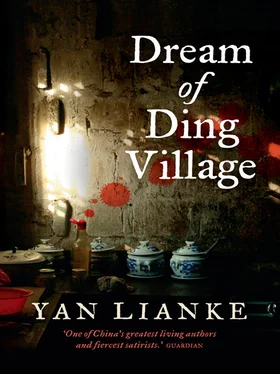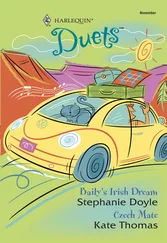The residents filed into the classroom and began taking their seats. Among them were Ding Yuejin, Zhao Xiuqin, Ding Zhuangzi, Li Sanren, Zhao Dequan and a sprinkling of other villagers, a few dozen in all. The classroom was crowded. There were people everywhere, sitting or standing, some leaning on walls. Everyone seemed relaxed and smiling, just happy to be together. Like students waiting for the start of class, they waited quietly for Grandpa to begin the meeting.
Standing at the front of the classroom on a dais made from three layers of bricks, Grandpa gazed at the villagers like a teacher surveying his class. ‘Settle down,’ he said. ‘Everyone take a seat.’ When those who had been leaning against walls or windowsills had sat down, Grandpa addressed the group in a practised voice.
‘First, I’ve spent my life working in this school, and I suppose you could say I’m halfway to being a teacher. Now that you’re living in this school, you’ll listen to me and do as I say. If anyone has a problem with that, please raise your hand.’
Grandpa eyed the assembled residents and waited. Several grown-up villagers began snickering in their seats like schoolchildren. Grandpa shot them a stern glance.
‘Okay, since no one raised their hand, that’s settled. Number one on the agenda: until we receive the government food subsidy, we’ll have to pool our staple food supplies. Ding Yuejin will be in charge of keeping accounts. Your contributions of flour, rice and grain will be sorted for quality and recorded in your account. If you contribute more than your monthly quota, your contribution for the following month will be reduced. Likewise, if you contribute less than your quota one month, you’ll be expected to make up for it the next.
‘Two: although you won’t be charged for the water you use, we’ll take up a collection for the electricity bill each month. I don’t want to see anyone leaving the lights on all night long. You should try to conserve electricity, just like you would at home.
‘Three: the women will handle the cooking, and the men will do maintenance and other chores around the school. The very sick will have lighter workloads, and those who are healthy will be expected to take up the slack. I’m putting Zhao Xiuqin in charge of the cooking. You ladies can take turns cooking every day, or every three days, or whatever schedule suits you best.
‘Four: I’m in my sixties now, and like most of you, my days are numbered. None of us knows how much time we’ve got left, so let’s be honest with each other. Once we’re dead, other people in this village still have to go on living. One of these days we’ll be gone from this school, and the kids will be back in their classes. So let’s agree that starting today, you won’t go running back home willy-nilly, kissing your wives and kids and spreading the disease to your families.
‘Another thing: now that you’re living in this school, I trust that everyone will respect school property. That goes for everything, including chairs, desks, windows and walls. Don’t go thinking that because these things don’t belong to you, you can do with them what you like. Please treat this school with the same respect you’d treat your home.
‘Five: the reason we’re here is not just to avoid infecting other people, but to make your lives more pleasant, and to enjoy the time you have left. You can play chess or watch television, read or sleep. If you want some special activity or a particular kind of meal, all you have to do is ask. Whatever you want to do, you can do. Whatever you want to eat, you can eat. I want to say one thing to everybody here: I know that the fever feels like the end of the world, but if the world’s going to end anyway, your final days ought to be your happiest ones.’
Here, Grandpa paused and turned to look out of the window at the snowstorm. The snowflakes were as large as pear blossoms, and just as white. As they fell, they transformed the trampled, muddy schoolyard into a clean white expanse.
A rush of cold air came through the door, mingling with the classroom stench of sickness, like clean fresh water swirling into a muddy stream. Outside in the schoolyard, a spotted dog that had most likely followed its owner to the school sat beneath the basketball hoop. It seemed to be staring at the classroom windows, hoping to find its master inside. Now covered in snow, it looked like a little lost sheep.
Grandpa turned his attention back to the classroom. Surveying the crowd of villagers, a sea of sickly faces dotted with dark scabs, he asked, ‘Does anyone have anything to say? If not, let’s get busy cooking. Today is our first meal together, so no matter who cooks, let’s make sure it’s a good one. Since we’re cooking for everyone, you can use the big steel woks we bought for out-of-town students. Stoves are in the student kitchens on the west side of the basketball court.’
And with that, the meeting was adjourned.
Amid much laughter and excited chattering, the villagers clustered around the stove in the middle of the classroom. Others returned to their sleeping quarters to set up beds and unpack their bedrolls and belongings.
Grandpa left the classroom and went outside into the storm, snowflakes clinging to his face like droplets of water. Each gust of wind sent more snow hurling into his face, which was still glowing with the warmth of the classroom. Grandpa felt pleased with the points he’d made in his speech, the rules he had laid out for life in the school.
As the snow melted quickly on his warm skin, it streamed down his face like tears.
A white world. The schoolyard, a vast white plain that crunched beneath his feet as he walked.
‘Dad!’ Grandpa turned around to see that his son had caught up with him.
‘Will I be sleeping in the big dormitory with the others?’
‘Why not stay with me?’ Grandpa suggested. ‘It’s a smaller room, much warmer.’
‘Sure,’ Uncle agreed, sounding relieved. ‘But Dad, why did you have to go and put Ding Yuejin in charge of the accounts?’
‘He was the village accountant. He’s got experience.’
‘Still, you would have been better off with me in charge.’
‘How so?’ asked Grandpa.
‘I’m your son. No matter what, you know you can trust me.’
‘I know I can trust him, too.’
Uncle laughed. ‘I suppose it doesn’t matter who you choose. We’re all going to die soon anyway, so it’s not like anyone’s got a motive to steal.’
They trudged towards Grandpa’s rooms beside the school gate, and were soon swallowed up in the snowstorm.
Their voices carried on the air.
Their outlines melted into snow.
2
After the snow had melted, the sick villagers found that life in the school was better than they had imagined. Even paradise couldn’t measure up to this. When Grandpa shouted that the food was ready, everyone would gather around with their bowls in their hands. You could pick and choose whatever you wanted to eat, and take as much food as you liked. There were many dishes to choose from: savoury or sweet, hearty or light, thick soups or thin, vegetarian stir-fry, fish or meat. When you had finished eating, you rinsed your bowl in the sink and returned it to your assigned shelf, or stored it in one of the many bags that hung everywhere, even from the branches of trees. When someone found a herbal remedy said to cure the fever, the herbs were boiled in a large cauldron and ladled into bowls for everyone to drink. When someone got a treat from home — dumplings, say, or steamed pork buns — they would be divided among the whole group.
Apart from meals and medicine, there wasn’t much to do. You could bask in the sun or watch television, or round up a foursome for a few hands of poker. Some immersed themselves in two-man games of Chinese chess or Go.
Читать дальше












